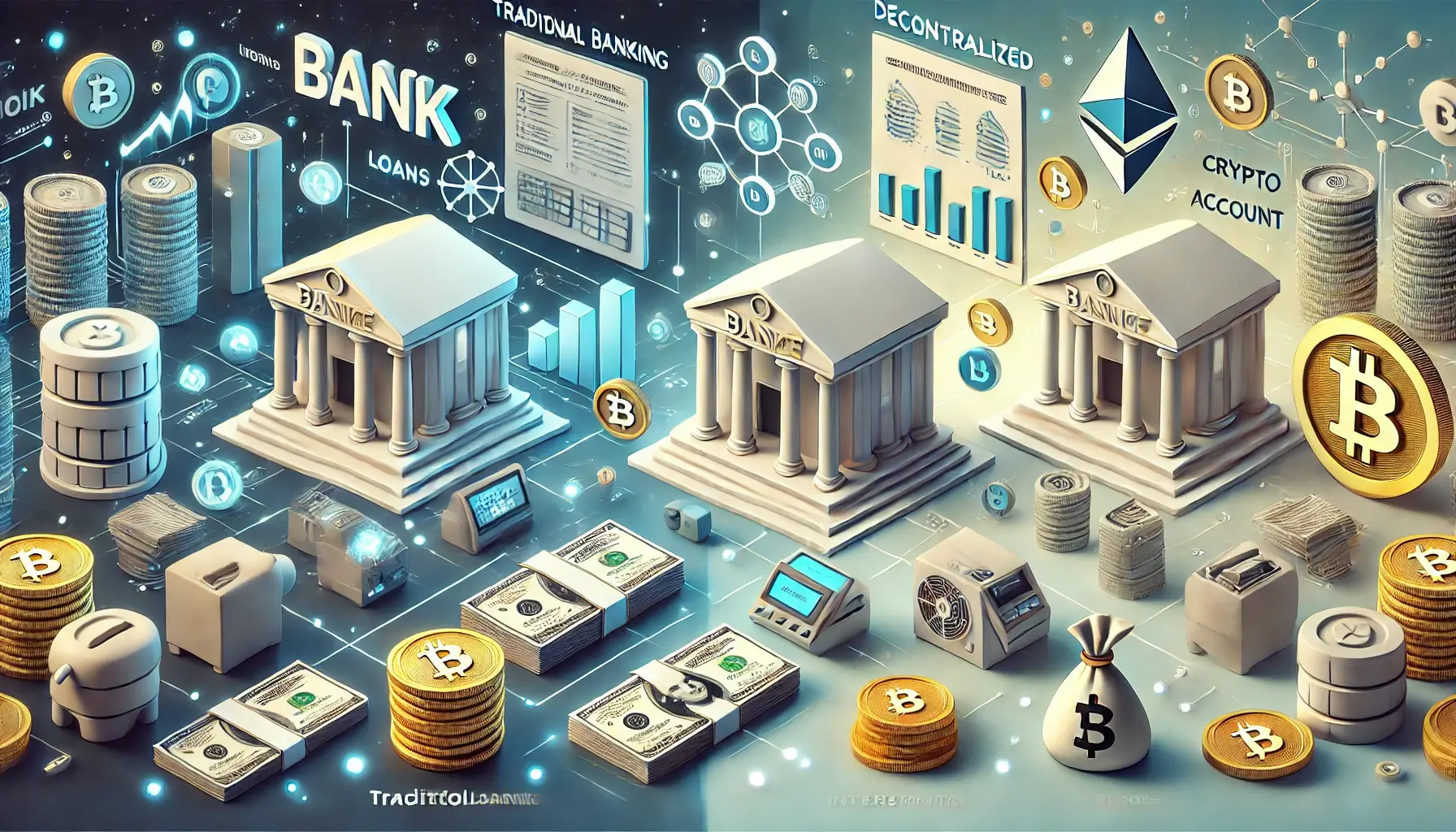How Decentralized Finance Is Challenging Traditional Banking: A New Financial Frontier
Traditional banking has long been the cornerstone of the global financial system, providing loans, savings accounts, and a wide range of financial services. However, the rise of decentralized finance (DeFi) is introducing a powerful alternative that challenges the very foundation of traditional banking. Built on blockchain technology, DeFi platforms aim to create an open and transparent financial system where anyone with an internet connection can access financial services without intermediaries like banks. In this blog, we’ll explore how DeFi is reshaping the financial landscape and offering compelling alternatives to traditional banking.
What Is Decentralized Finance (DeFi)?
Decentralized Finance, or DeFi, refers to a collection of financial applications built on blockchain networks that offer decentralized alternatives to traditional financial services. Instead of relying on centralized authorities like banks, DeFi platforms use smart contracts—self-executing contracts with the terms of the agreement directly written into code—to facilitate transactions.
By removing intermediaries, DeFi platforms aim to provide faster, cheaper, and more inclusive financial services. These platforms allow users to lend, borrow, save, trade, and invest their assets in a completely decentralized and transparent manner.
If you’re interested in learning more about blockchain’s impact on digital transactions, check out our previous blog on the role of crypto in digital payments.
Key Areas Where DeFi Is Challenging Traditional Banking
DeFi is disrupting traditional banking by offering innovative alternatives to core financial services. Let’s dive into some of the main areas where DeFi is changing the game.
1. Loans and Borrowing
In traditional banking, obtaining a loan involves a lengthy application process, credit checks, and approval by centralized authorities. DeFi platforms, on the other hand, offer instant lending and borrowing without the need for a bank. Through DeFi protocols like Aave or Compound, users can lend their assets to others or borrow against their crypto holdings, all without needing to interact with a traditional bank.
These platforms use smart contracts to automate the lending process. Borrowers provide crypto assets as collateral, and the smart contract ensures that if the borrower defaults, the collateral is automatically liquidated to repay the loan. This collateralized lending model eliminates the need for credit checks and lengthy approval processes, making loans more accessible.
For a deeper dive into how smart contracts work, check out our blog on blockchain’s use of smart contracts in digital advertising.
2. Savings Accounts and Interest
In traditional banking, savings accounts offer very low interest rates, often failing to keep up with inflation. In contrast, DeFi platforms provide much higher interest rates through yield farming and liquidity pools. On platforms like Yearn Finance and Curve, users can earn competitive returns by lending their crypto assets to liquidity pools, which are then used by other users to facilitate trades and loans.
Yield farming, a key feature of DeFi, allows users to stake or lend their crypto assets in return for high yields, far surpassing the interest rates provided by traditional savings accounts. The decentralized nature of these platforms allows users to directly control their assets and maximize their earnings.
3. Decentralized Exchanges (DEXs)
Traditional banks often work with centralized exchanges for trading and investment services, which involve fees, regulations, and delays. DeFi, on the other hand, introduces Decentralized Exchanges (DEXs) like Uniswap and SushiSwap. These platforms enable users to trade cryptocurrencies directly with one another, eliminating the need for an intermediary.
DEXs operate using automated liquidity protocols, where users contribute crypto assets to liquidity pools. This ensures that trades happen directly between users, cutting out the need for brokers or centralized exchanges. DEXs provide faster, more transparent, and cost-effective ways for users to trade digital assets compared to traditional systems.
4. Financial Inclusivity and Global Access
One of DeFi’s most compelling features is its ability to provide financial services to underserved populations. In traditional banking, millions of people remain unbanked due to geographical, economic, or political reasons. DeFi platforms remove these barriers by offering decentralized financial services to anyone with an internet connection, regardless of their location or financial background.
This inclusivity is crucial in regions with limited access to traditional banking services. By allowing users to participate in global financial systems without needing a bank account, DeFi opens up new opportunities for wealth creation and financial independence.
For more insights into how blockchain is providing inclusive solutions, check out our blog on how blockchain is transforming the gig economy.

Advantages of DeFi Over Traditional Banking
1. Transparency
DeFi platforms operate on public blockchains, meaning that all transactions are transparent and can be verified by anyone. This level of transparency ensures trust and eliminates the hidden fees or opaque processes often associated with traditional banking.
2. Lower Fees
Without intermediaries, DeFi platforms can offer financial services with significantly lower fees. Traditional banks charge fees for transfers, withdrawals, and account maintenance, whereas DeFi platforms reduce these costs through automation and decentralization.
3. No Central Authority
DeFi operates without centralized control. This means users maintain complete control over their assets, unlike traditional banking systems where a central authority can freeze accounts or impose restrictions.
4. Faster Transactions
DeFi platforms enable instant transactions, particularly for lending and borrowing. Unlike traditional banks, which can take days to process transactions, DeFi smart contracts execute transactions automatically and in real-time.
Conclusion: The Future of Finance with DeFi
Decentralized Finance (DeFi) is offering a revolutionary alternative to traditional banking. By leveraging blockchain technology, DeFi platforms provide decentralized, transparent, and inclusive financial services that challenge the status quo of centralized banking. With faster transactions, lower fees, and greater accessibility, DeFi is poised to reshape the future of finance. As adoption grows, we may see traditional banks either adapt or risk becoming obsolete.
For more insights into how blockchain is changing other sectors, including digital advertising and content creation, check out our previous blogs.
FAQs
1. How does DeFi differ from traditional banking?
DeFi removes intermediaries and offers decentralized financial services using smart contracts. In contrast, traditional banking relies on centralized authorities like banks and financial institutions to manage transactions.
2. Can anyone use DeFi platforms?
Yes, anyone with an internet connection and a cryptocurrency wallet can use DeFi platforms. There are no geographical or financial restrictions, making DeFi highly accessible to people around the world.
3. Are DeFi platforms safe to use?
While DeFi platforms are transparent and decentralized, they are still relatively new and can have risks, including bugs in smart contracts and volatile market conditions. Users should always conduct thorough research before engaging with DeFi services.
For more insights and detailed guides on cryptocurrency, visit our Crypto Guides Section.
Stay Updated
For the latest updates on cryptocurrency trends and news, follow us on:
- Twitter: https://twitter.com/FreeCoins24
- Telegram: https://t.me/freecoins24
Stay informed with the latest strategies and insights in the world of cryptocurrency at FreeCoins24.io.
Special Offer
For an enhanced trading experience, consider Bybit. Sign up through our referral link to unlock exclusive rewards, including up to $30,000 in deposit bonuses, and elevate your trading journey.

















